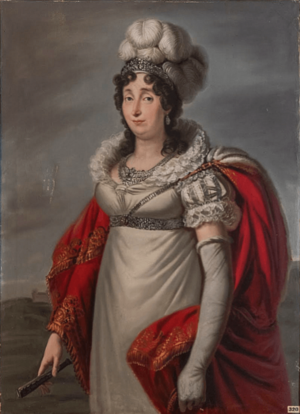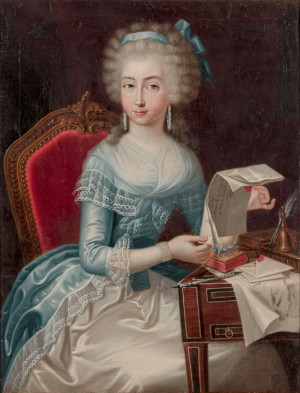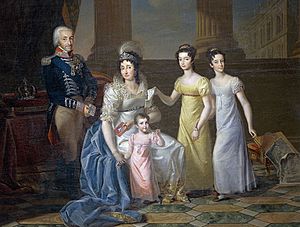Maria Theresa of Austria-Este, Queen of Sardinia facts for kids
Quick facts for kids Maria Theresa of Austria-Este |
|||||
|---|---|---|---|---|---|
| Archudchess of Austria-Este | |||||
 |
|||||
| Queen consort of Sardinia | |||||
| Tenure | 4 June 1802 – 12 March 1821 | ||||
| Born | 1 November 1773 Royal Palace of Milan, Milan, Duchy of Milan |
||||
| Died | 29 March 1832 (aged 58) Geneva, Switzerland |
||||
| Burial | Basilica of Superga, Turin | ||||
| Spouse | |||||
| Issue among others... |
Maria Beatrice, Duchess of Modena Maria Teresa, Duchess of Parma Maria Anna, Empress of Austria Maria Cristina, Queen of the Two Sicilies |
||||
|
|||||
| House | Austria-Este | ||||
| Father | Ferdinand Karl, Archduke of Austria-Este | ||||
| Mother | Maria Beatrice d'Este, Duchess of Massa | ||||
| Religion | Roman Catholicism | ||||
Maria Theresa of Austria-Este (German: Maria Theresia Josefa Johanna; 1 November 1773 – 29 March 1832) was a royal princess who became the Queen of Sardinia. She was the wife of Victor Emmanuel I of Sardinia.
Maria Theresa was born an archduchess of Austria-Este. She was also a princess of Modena. Her parents were Ferdinand Karl, Archduke of Austria-Este, and Maria Beatrice d'Este, Duchess of Massa. Her husband became king in 1802. However, his reign ended in 1821 when he stepped down. This happened after a revolution where he did not want to accept a new constitution. Maria Theresa was part of the House of Austria-Este.
Contents
Early Life and Family
Maria Theresa was born on 1 November 1773. Her birthplace was the Royal Palace of Milan in Milan. She was the second child and first daughter of her parents. Her father, Archduke Ferdinand Karl of Austria, was the governor of Milan. Her mother, Maria Beatrice d'Este, was the heir to the Duchy of Modena.
Maria Theresa was named after her grandmother, Empress Maria Theresa of Austria. This was a tradition for the empress's eldest granddaughters. Maria Theresa had an older brother, Josef Franz. Sadly, he died as a baby in 1772, before she was born.
Her Royal Marriage
Victor Emmanuel, who was the Duke of Aosta, was still unmarried at age twenty-nine. This was quite old for a royal in the 1700s. Maria Theresa was chosen to be his wife. Before the marriage, people gathered much information about her. They wanted to know about her looks, personality, and manners.
Maria Theresa was married by proxy on 29 June 1788 in Milan. A proxy marriage means someone stands in for the groom or bride. On 25 April 1789, she married Victor Emmanuel in person in Novara. She was 15 years old at the time. Their marriage was described as happy. Victor Emmanuel spent a lot of time with their children. They had seven children together, and four of them lived to be adults.
Life at Court
Maria Theresa became good friends with Marie Clotilde of France. Marie Clotilde was the wife of Charles Emmanuel, who was the Prince of Piedmont. Maria Theresa was also close to the Duchess of Chablais. When she married, her husband was the Duke of Aosta. So, she was known as the Duchess of Aosta. Later, she became queen.
The couple had six daughters and one son. Their son died when he was young. In 1798, Napoleon Bonaparte invaded Savoy. Maria Theresa and her family had to leave. They first went to Tuscany and then to Sardinia.
Becoming Queen
In 1802, Charles Emmanuel IV of Sardinia stepped down from the throne. Maria Theresa's husband became the new King of Sardinia. This made Maria Theresa the Queen consort. However, a war was happening. So, she had to stay on the island of Sardinia. She waited until the war ended in 1814 to return to the capital city, Turin.
When Maria Theresa first arrived in Turin, people were happy to see her. But soon, she became unpopular. People said she wanted to undo changes made during the French occupation. She was also accused of treating anyone who worked with the French badly. Her actions may have contributed to the unhappiness that led to the rebellions in 1821.
In 1821, a revolution began. Her husband, Victor Emmanuel, decided to step down. He made his brother, Charles Felix, the new king. During the unrest, Maria Theresa said she was ready to rule if needed. Instead, she followed her husband to Nice after he gave up the throne.
Maria Theresa lived eight years longer than Victor Emmanuel. Some people thought she tried to convince her brother-in-law, Charles Felix, to name her brother as the next heir. Her brother was Francis IV, Duke of Modena. He was also married to her eldest daughter. Because people were still upset with her, she was not allowed to return to Turin until 1831. She was buried in the Basilica of Superga.
A special type of couch, called a daybed, that belonged to Maria Theresa is kept at Attingham Park.
Her Children
Maria Theresa and Victor Emmanuel had seven children. Four of them lived to adulthood.
- Princess Maria Beatrice Vittoria Josepha of Savoy (1792 – 1840); She married Francis IV, Duke of Modena. They had children. She became the Duchess of Modena.
- Princess Maria Adelaide Clothilde Xaveria Borbonia of Savoy (1794 – 1802); She died as a child.
- Prince Charles Emmanuel of Savoy (1796 – 1799); He died as a child from smallpox.
- A daughter (1800 – 1801); She died as a baby.
- Princess Maria Teresa Fernanda Felicitas Gaetana Pia of Savoy (1803 – 1879); She married Charles II, Duke of Parma. They had children. She became the Duchess of Parma and Piacenza, and the Duchess of Lucca.
- Princess Maria Anna Ricciarda Carolina Margherita Pia of Savoy (1803 – 1884); She married Ferdinand I of Austria. They had no children. She became the Empress of Austria and the Queen of Hungary.
- Princess Maria Cristina Carlotta Giuseppina Gaetana Elise of Savoy (1812 – 1836); She married Ferdinand II of the Two Sicilies. They had children. She became the Queen of the Two Sicilies.
See also
 In Spanish: María Teresa de Austria-Este (1773-1832) para niños
In Spanish: María Teresa de Austria-Este (1773-1832) para niños
 | Calvin Brent |
 | Walter T. Bailey |
 | Martha Cassell Thompson |
 | Alberta Jeannette Cassell |



